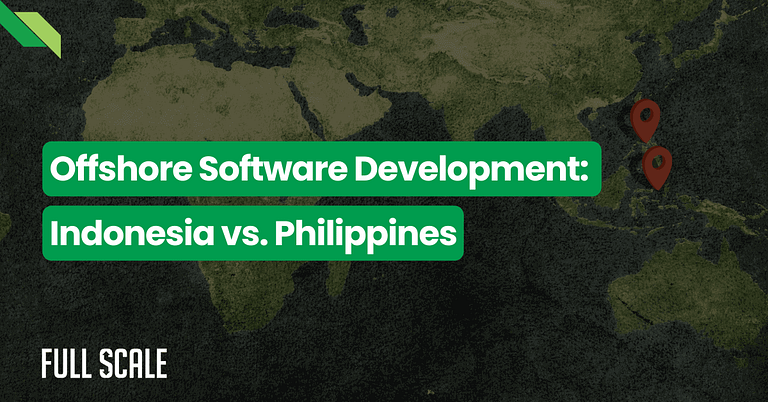Last Updated on 2025-04-06
Are you considering offshoring your software development but unsure which country to choose?
Indonesia and the Philippines are two popular Southeast Asian options with unique advantages.
If you’re torn, explore the pros and cons of offshoring to these two countries to help you make an informed decision for your business.
And clearly understand which country best fits your offshore software development needs.
Indonesia and Philippines As Top Offshoring Destinations
In recent years, Indonesia and the Philippines emerged as the top countries for offshore software development.
Indonesia is one of the most dynamic democracies in East Asia Pacific. Having maintained political stability and becoming a middle-income nation, it’s a prime location for investors.
Likewise, the Philippines has grown over the years, becoming one of the fastest-growing economies across Southeast Asia. It’s fast becoming the top hub to draw software development talent.
Both countries offer many benefits to foreign business owners. If you decide to work with either one, you must first identify which suits your business needs.
Comparative Analysis: Indonesia vs. Philippines
To find out which country fits your project requirement, let’s study how they fare in various aspects of offshoring. Examine the table below:
| Indonesia | Philippines | |
| Cost of Offshoring | – The average monthly salary of software developers ranges from $400 to $600 | – Slightly higher than Indonesia – $986.56 per month |
| Talent Pool | – Indonesia is currently grappling with a shortage of tech talent, which could potentially threaten the growth of its promising technology industry | – The Philippine Software Industry Association (PSIA) reports that the country has around 190,000 programmers – Employment in the IT industry is expected to grow in the next years, with as many as 2.5 million people working in it by 2028 |
| Language Proficiency | – Indonesia ranks 79th on the English Proficiency Index and is under the Low Proficiency category – The Indonesian government is working on improving the proficiency level by allotting around 20% of the national budget to education | – The Philippines ranks 20th in the world for English proficiency – Most tech talent can speak English fluently |
| IT Infrastructures | – National connectivity is an issue in Indonesia, with internet coverage and speed still needing improvement –Indonesia’s median download speed for fixed broadband stands at 28.28 Mbps, ranking it 124th out of 182 countries | – Internet connectivity in the Philippines is steadily increasing, and by 2029, internet penetration will reach 77.56% |
| Government Support and Policies | – Indonesia faces several employment challenges, including low compliance with existing labor regulations, youth unemployment, skills shortages, and skills mismatches | – Benefit from the Philippines’ policies for foreign investors – The Philippine government actively supports the IT-BPM industry through various initiatives, including tax incentives, infrastructure development, and programs |
| IP Protection and Security | – Indonesia faces challenges regarding intellectual property (IP) protection and enforcement – Online piracy, especially of piracy-related gadgets and programs, is a problem – Illegal video recording and unlicensed software usage are also ongoing issues | – The enforcement of intellectual property (IP) rights is inconsistent in the Philippines despite generally supportive laws and policies |
| Potential Challenges | – Limitations in terms of internet connectivity, bandwidth, and reliability – Limited tech talent |
Cultural Compatibility
Cultural compatibility is essential for successful offshoring of software development.
Discover the cultural compatibility of these countries with the US:
| Indonesia | Philippines | |
| Work Ethics | – The Indonesian work culture emphasizes group decision-making and teamwork – Collective success is given precedence over individual accomplishments | – Filipinos are highly committed to their work – They go above and beyond to deliver quality work |
| Communication Style | – In Indonesia, people communicate indirectly to maintain harmony and avoid conflicts, reflecting their cultural preference for unity and politeness | – Filipinos have a warm and friendly communication style – They are easygoing and are highly accommodating to foreigners |
| Time Zone Differences | – 12 hours ahead of EST | – 12 hours ahead of EST |
When comparing Indonesia and the Philippines for offshore software development, the Philippines is the better choice for most businesses.
Despite Indonesia’s growing IT industry and attractive market potential, the country’s own talent shortage can hinder the success of offshore development projects.
The Philippines Is Ideal for Offshore Software Development
Here are the key reasons why the Philippines should be your top choice.
- Cost-effectiveness: The Philippines offers highly competitive rates for software development services, allowing you to significantly reduce your development costs without compromising quality.
- Large, skilled talent pool: With over 300,000 IT professionals and a strong emphasis on IT education, the country provides access to a wide range of skilled developers across various technologies and frameworks.
- English proficiency: As the third-largest English-speaking country, the Philippines ensures seamless communication between you and your developers. It reduces the risk of misunderstandings and enhances collaboration.
- Cultural compatibility: Filipino developers are known for their strong work ethic, loyalty, and friendly communication style. Thus, it’s easier for foreign companies to build rapport and foster long-term partnerships with them.
- Time zone advantage: The Philippine time zone offers a convenient overlap with US business hours, facilitating real-time collaboration and faster project turnaround times.
- Government support: The Philippine government actively supports the growth of the IT industry. The government offers tax incentives, training programs, and infrastructure development, creating a conducive environment for offshore software development.
Partnering with Full Scale for Offshore Success
While the Philippines offers numerous advantages for offshore software development, navigating the process can still be challenging.
Partner with Full Scale, and we’ll help you find software developers you will love.
Full Scale, with its headquarters in the US and offshore operations in the Philippines, specializes in providing top-tier software development talent to companies worldwide. By working with Full Scale, businesses can:
- Quality Talent Pool—Find and hire pre-vetted, highly skilled developers.
- Excellent Work Culture—Benefit from a supportive environment that nurtures the offshore team’s growth.
- Seamless Communication—Enjoy easy and convenient collaboration through a robust client portal.
- Efficient Management—Leverage Full Scale’s expertise in building and managing offshore teams.
- Flexible Team Setup—Scale your development teams quickly and cost-effectively.
If you’re considering offshoring your software development, the Philippines should be at the top of your list.
Partnering with a reliable offshore development company like Full Scale can help businesses overcome these challenges and ensure a successful offshoring experience.
Hire Developers from the Philippines

Matt Watson is a serial tech entrepreneur who has started four companies and had a nine-figure exit. He was the founder and CTO of VinSolutions, the #1 CRM software used in today’s automotive industry. He has over twenty years of experience working as a tech CTO and building cutting-edge SaaS solutions.
As the CEO of Full Scale, he has helped over 100 tech companies build their software services and development teams. Full Scale specializes in helping tech companies grow by augmenting their in-house teams with software development talent from the Philippines.
Matt hosts Startup Hustle, a top podcast about entrepreneurship with over 6 million downloads. He has a wealth of knowledge about startups and business from his personal experience and from interviewing hundreds of other entrepreneurs.





